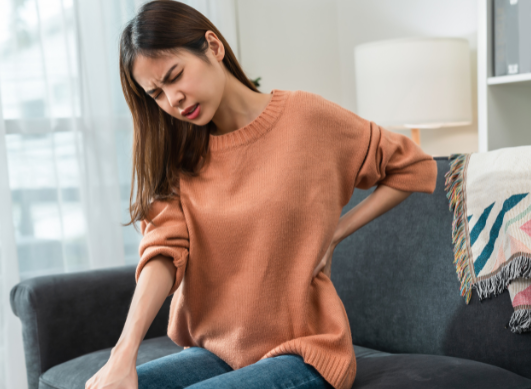Gastrointestinal Disorders and the Coronavirus
Published May 5, 2020 • Updated May 6, 2020 • By Camille Dauvergne
Approximately 1.6 million Americans currently have Inflammatory Bowel Disease (IBD). And this number is constantly increasing, as as many as 70,000 new cases are diagnosed in the US each year! The conditions that fall under the IBD umbrella include Crohn's disease and ulcerative colitis (UC). Patients are most often diagnosed between the ages of 20 and 30. While there is no known cure at present, several effective symptomatic treatments are available. However, some of these treatments can cause immunosuppression, which worries patients in this period of coronavirus pandemic!
What is the risk of serious complications? Should immunosuppressive treatments be temporarily stopped? What precautions should be taken? We answer your questions!

Does my GI condition put me at greater risk of complications with COVID-19?
According to Dr. William Berrebi, a gastroenterologist, the risk of complications with COVID-19 is not caused by the disease itself, whether Crohn's or UC, but rather by the treatments taken to mitigate the disease.
If you are taking mesalazine (Apriso, Pentasa, Asacol HD) and your disease is stable and controlled, there is no particular risk of complications.
If you are on corticosteroids with a dosage higher than 20 mg (Prednisone, Prednisolone), immunosuppressant drugs (Imuran, Methotrexate) or biologics (Remicade, Humira) then there may be a significant risk of complications in case of COVID-19 infection as these treatments weaken your immune system. You are therefore more vulnerable to an infection. It is therefore extremely important to follow strictly the barrier gestures as well as the confinement in case of taking immunosuppressive treatments.
Should I stop my immunosuppressive drugs to avoid a severe form of COVID-19?
You should never stop or change your chronic treatment, whether immunosuppressive or not, without consulting your doctor first. This could lead to a worsening of your gastrointestinal condition and complications specific to it. It will also not protect you against the coronavirus.
For certain COVID-19 patients, it may be possible to temporarily stop corticosteroid/immunosuppressant/biologic medications to reduce the risk of serious complications, but only under medical supervision. Decisions should be made on a case-by-case basis with a doctor.
If you have no COVID-19 symptoms, continue taking your medications and pursuing your medical follow-up (appointments, tests, etc.) to keep your chronic condition stable.
In the case of symptoms suggestive of COVID-19 (cough, fever, shortness of breath, aches and pains, etc.) contact your GP and/or specialist who will tell you how to proceed. In the case of a life-threatening emergency, such as severe respiratory distress, call 911 immediately.
I'm taking a preventative course of mesalazine, is it risky given the current situation??
Preventive or even curative treatment with mesalazine does not present any particular risk with regard to COVID-19. Continue to take your treatment as usual.
I have had a permanent ostomy, am I more at risk of complications?
The stoma itself is not a risk factor for complications with COVID-19, especially if you have had it for some time and are doing well. But again, corticosteroids, immunosuppressant drugs, or biologics may increase this risk.
If you have any questions about your treatment, do not hesitate to contact your doctor by phone or by teleconsultation.
How can I tell distinguish the digestive symptoms of COVID-19 from a relapse of my GI condition?
SARS-CoV-2 can cause digestive problems such as diarrhea, vomiting and abdominal pain, which can be mistaken for symptoms of Crohn's disease or UC. If these digestive symptoms are isolated, it does not mean that it is not the coronavirus. Dr. Berrebi points out that one in six patients with coronavirus admitted to hospital has isolated digestive symptoms several days before the onset of other symptoms such as fever and breathing difficulties.
In case of isolated digestive symptoms, do not hesitate to take your temperature regularly and contact your doctor who will assess your overall condition.
What explains the digestive symptoms of COVID-19?
The digestive symptoms observed in COVID-19 patients can be explained by different mechanisms:
- A direct toxicity of SARS-CoV-2 (coronavirus) in the gastrointestinal tract because the same receptors are present in the gastrointestinal tract as in the lungs.
- An autoimmune reaction with release of cytokines (pro-inflammatory molecules) in the gastrointestinal tract due to infection.
- An imbalance of the intestinal microbiota also induced by the infection.
I'm feeling a lot of stress, can it make Crohn's disease/UC worse?
Stress may play a role in the progression of your Crohn's disease or your UC.
It is important to relax by doing one or more activities that you enjoy every day. Continuing even moderate daily physical activity can also help reduce your stress levels. You can try relaxation techniques such as meditation or yoga that can help you regulate your breathing and improve your resistance to stress.
The GI Research Foundation offers a series of videos on its site to assist with stretching and relaxation. You will find numerous videos and audio clips of sessions for yoga, breathing, and meditation!
What should my return to work look like when the lockdown is over?
It is best to seek the advice of your doctor about returning to work, especially if you are undergoing immunosuppressive treatment or biotherapy. If the risk is too great, your doctor may recommending starting or extending your sick leave.
If you plan to return to work, it is absolutely essential to respect social distancing (minimum 6 feet of distance from others), wear a proper mask or respirator, and wash your hands very regularly with soap or hand sanitizer.
How can I find support on Carenity?
Carenity currently has thousands of patients and relatives of patients affected by gastrointestinal diseases. On the platform, you can find support from other members of the community. It is important that we help one another especially in this difficult context of the COVID-19 pandemic. Feel free to join in on the discussions below!
- Biotherapy and COVID-19: Has the virus had an impact on your treatment?
- Crohn's and coronavirus: what measures should be taken?
- Coronavirus: How to keep busy while social distancing?
- Today I feel... A coronavirus special!
- Coronavirus: What we know about the end of the lockdown!
Was this article helpful to you? Do you have any other tips to share with the community?
Take care and stay home!
https://giresearchfoundation.org/resources/
http://www.observatoire-crohn-rch.fr/les-mici-en-france/
https://www.inserm.fr/information-en-sante/dossiers-information/maladies-inflammatoires-chroniques-intestin-mici
https://www.afa.asso.fr/lafa-a-vos-cotes-pendant-le-confinement/
1 comment
You will also like

Ulcerative colitis and mental health: Is there a hidden link between flare-ups and feelings?
Apr 1, 2025

 Facebook
Facebook Twitter
Twitter


